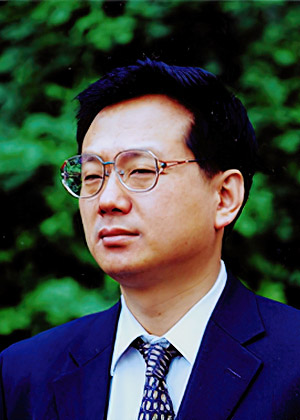
Chemistry

Lei jiang
Bioinspired superwetting interfacial materials and interfacial chemistry
Abstract: As for basic research, Prof. Jiang Lei has studied the superhydrophobicity of lotus leaf surface and the superhydrophilicity of animal cornea since 1998, and found that the basic principle of static superwettability is the static wetting is determined by the cooperative effect of nanostructure and surface energy. He then determined the intrinsic threshold of liquid lyophilicity-lyophobicity, modified the lyophilicity-lyophobicity limitation of all liquids in Young's equation, and proposed that the transition point of the superlyophilicity and superlyophobicity on the nanostructure is the lyophilicity-lyophobicity limitation. Based on the study of static superwettability, he studied the dynamic superwettability characteristics of a variety of organisms, such as the conical microstructure on the surface of water strider legs, spider silk and cactus, and the inner conical microstructure of ion channels, all had the directional driving ability of microfluidics, and he proposed the direction of liquid transport is regulated by chemical composition gradient, rough gradient, curvature gradient, etc. By learning from nature, he established a superwetting interfacial material system including 64 combinations, and expanded to various liquid systems with different pressure and temperature ranges, leading and promoting the global development of this field. The number of published papers shows a significant upward trend year by year. By 2021, more than 23000 papers have been published. So far, 94 countries and more than 1400 research institutions in the world are engaged in research in the field of superwettability. As for application, more than ten superwetting interfacial material systems are applied to energy field (osmotic energy conversion, high-efficiency heat transfer), health field (cancer detection, medical catheter), resource field (freshwater collection, oil production enhancement), national defense field (weapon self-cleaning, high temperature anti-adhesion), environmental field (oil-water/emulsion/dye separation, pesticide synergism), material field (micro-processing technology and preparation technology). chemical industry (high-efficiency and high-selectivity catalytic system). At present, there are more than 70 authorized patents, some of which have realized technology transformation. In 2021, superwettability technology was selected as one of the IUPAC top ten emerging technologies in chemistry.
Awardee:Professor Lei jiang was born in March 1965 in Changchun, Jilin Province. In 1987, he graduated from the Department of Physics of Jilin University with a bachelor's degree in solid physics. In 1990, he received a master's degree in physical chemistry from the Department of Chemistry of Jilin University. From 1992 to 1994, he studied in Tokyo University of Japan as a doctoral student jointly trained by China and Japan, and returned to China to obtain his doctoral degree. From 1994 to 1996, he worked as a post-doctoral fellow in Tokyo University. From 1996 to 1999, he was a senior researcher in the Kanagawa Academy of Science and Technology. In 1998, he was selected into the "Hundred Talents Program" of the Chinese Academy of Sciences. From 1999 to 2015, he was a professor at the Institute of Chemistry, Chinese Academy of Sciences. In 2015, he and his group moved to the TIPC. From 2008 to 2019, he was also the dean of the school of chemistry of Beihang University. In 2009, he was elected as an academician of the Chinese Academy of Sciences. In 2012, he was elected as an academician of the Third World Academy of Sciences. In 2016, he was elected as a foreign academician of the American Academy of Engineering. In 2022, he was elected as a foreign academician of the Australian Academy of Science.
Prof. Lei Jiang has discovered and established the basic principle of the interfacial material systems with superwettability and extended them to successful innovative applications. So far, he has published more than 800 SCI papers, with >143,000 citations and an H-index of 177 (From Google Scholar). Due to his contribution to the development of superwettability, he won the “TWAS Prize in Chemistry” in 2011, the Advanced Science and Technology Award of “THE HO LEUNG HO LEE FUNDATION” in 2013 and the “Outstanding Achievement Award” of the Chinese Academy of Sciences in 2014. As the first awardee in mainland China, he acquired the “MRS Mid-Career Researcher Award” in 2014. In 2016, he won the “UNESCO Medals” for contributions to the development of nanoscience and nanotechnologies, and the “Nikkei Asia Prize”. In 2017, he won the “Humboldt Research Award” in Germany. In 2018, he was awarded the “Qiu Shi Outstanding Scientist Award” and “Nano Research Award”. In 2020, he won the “ACS Nano Lectureship Award”.